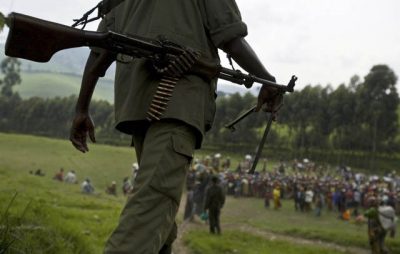By
Darell Maurice
In a recent report submitted to the UN Security Council, MONUSCO (United Nations Stabilisation Mission in the Congo) are concerned about the renewed activity of Rwandan rebels, the FDLR. The DRC government in Kinshasa rejects this information, stating that it is merely a way of the UN mission justifying its continued presence in the DRC.
All military operations initiated in the East to neutralise the FDLR rebels have not produced the desired effects on the ground. Far from the triumphalism the DRC government sometimes infers, MONUSCO think that the FDLR have retained their capacity to do harm.
In a recent report submitted to the Security Council, MONUSCO voiced their concern. The report considers that the operations initiated by the Armed Forces of the DRC (FARDC), in which MONUSCO troops have not been involved, have not fundamentally dismantled the networks that feed the FDLR. Instead, Rwandan rebels managed to reorganise, maintaining their capacity for action, to the frustration of the UN mission.
In their report the UN mission noted that “despite the operations since January by the Congolese army against the FDLR,” the military capabilities of these remain intact.”
Once informed of the report’s details, the government of the DRC immediately challenged MONUSCO. Government spokesperson Lambert Mende said that “MONUSCO simply wants to justify the extension of its mandate in the Democratic Republic of Congo. What (the report) says is completely wrong.”
Between the government in Kinshasa and MONUSCO, who is right, who is wrong? The question is worth its weight in gold. It must be noted that for the last military operation against the FDLR, Kinshasa strongly opposed the involvement of MONUSCO, suggesting that the military was able to fulfill its responsibilities to the end. Despite pressure from UN authorities, Kinshasa remained unmoved.
It is a fact that, away from MONUSCO’s involvement, Kinshasa has led and continues to lead the hunt for FDLR troops. And when MONUSCO reveals that this negative force has not lost all its capacity for harm, there is perhaps reason to wonder why.
Nevertheless, we know that, according to the UN experts’ report, the operations by the FARDC forced the Rwandan rebels to withdraw from some of their positions, temporarily disrupting their livelihoods in the process. However, the MONUSCO report calls into question the balance provided by the FARDC after these operations.
From the FARDC’s operations, 35 FDLR were killed and 313 others captured from 2 January to 24 August 2015. The captured FDLR were sent to Angenga military prison in the province of Equateur, a report which, according to MONUSCO, is not consistent with the reality on the ground. According to investigations conducted on the ground in August, “the Panel claims to have been able to verify the presence in this prison no more than 175 suspected members of the FDLR.”
In the same vein, the report also addresses the operation launched against Ugandan rebels of the ADF who have caused death and destruction in Beni and surroundings areas. In this regard, the UN report states: “The operations against the Allied Democratic Forces (ADF) continued for the second consecutive year, but did not allow for the withdrawal of some elements of the armed group.”
As for killings attributed to the ADF, the UN report indicates that from October 2014 to June 2015, between 350 and 450 civilians were killed in the Beni territory. The report stated that “the killings were partially committed by the ADF. Neither the FARDC nor MONUSCO have managed to protect the civilian population against these repeated attacks” before outlining the deficiencies in the operations against the ADF.
Overall, the experts’ report notes that operations against armed groups in the eastern part of the country “have limited success” and “did not allow to dismantle the groups targeted.” According to the same report, “armed groups continue to pose a threat to peace and stability in the region” mentioning the case of members of the FRPI‘s scattered military operations, but continue to commit serious violations of human rights against civilians.
It must be noted that on January 28 the FARDC officially launched operations against the FDLR, without the participation of MONUSCO. Initially, these operations benefited from the UN mission’s support, but military cooperation between the two was suspended following the appointment by Kinshasa of two generals suspected of serious violations of human rights in the east of the country.
It must be said that relations between MONUSCO and Kinshasa are no longer friendly. Both sides pretend to live together while remaining suspicious, one cautious regarding the other. In his last message to Parliament in a joint session, the Head of State clearly established the principle of of the UN troops’ gradual withdrawal in the DRC, stating that after the government’s intense efforts, defense forces and security services of the DRC had acquired the expertise to protect the country. This infers that the statements of MONUSCO regarding the FDLR merely throw oil on a fire that had already begun to fade.
The question on everybody’s lips however is that of how the combination of the forces of MONUSCO (25,000) and FARDC (25,000) can not put to an end that of some 1,600 FDLR combatants?
Darell Maurice
Darell Maurice is a Journalist based in the Democratic Republic of Congo’s capital city Kinshasa and works for Canal7kintv. He also blogs here.



No Comments Yet!
You can be first to comment this post!